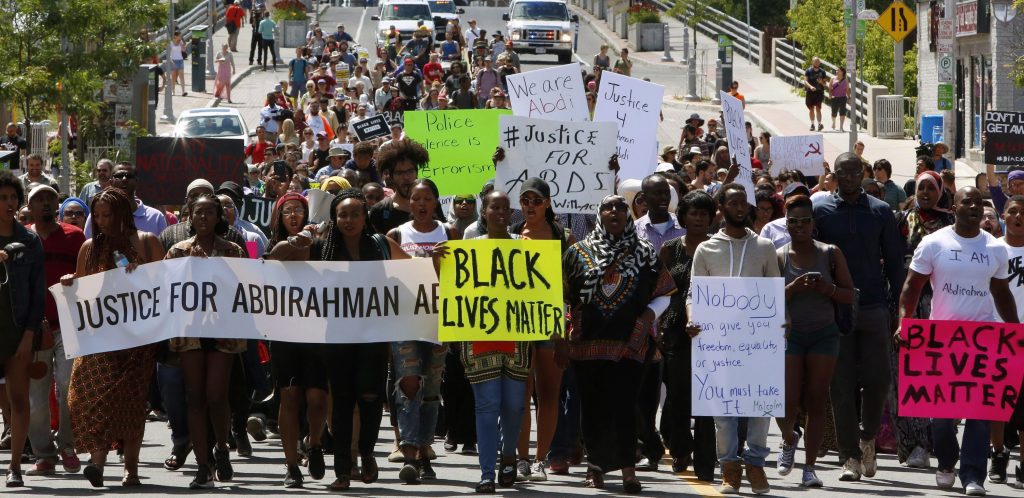Jury finds Abdirahman Abdi’s death a homicide; makes recommendations

The jury at a coroner’s inquest has deemed the 2016 death of an Ottawa man after his violent arrest a homicide, as it made more than 50 recommendations Tuesday aimed at preventing similar deaths in the future.
Abdirahman Abdi, 38, died in July 2016 after police responded to a 911 call reporting that a man was groping women outside a coffee shop in Ottawa. The inquest heard that Abdi appeared to be in a mental-health crisis at the time and that he suffered blows to his head during the arrest.
Inquest jurors are required to make a finding on the cause of death, but that carries no legal liability.
Advertisement
The inquest was mandatory under the law because Abdi was injured while in police custody. Its purpose was to examine the circumstances of his death, not assign blame.
After hearing several weeks of testimony from experts and key witnesses — including the police officer who was acquitted of criminal charges in the case — the inquest jury came back Tuesday evening with numerous recommendations for the Ottawa police force, its board and other authorities.
The first recommendation for the Ottawa Police Service (OPS) was to establish a mental-health advisory council that would provide guidance on police interactions with people who have mental-health issues. Any mental-health strategy should involve input from expert organizations and people with lived experience, the jury said.
The jury’s recommendations include reviewing and improving police use-of-force training and de-escalation strategies, as well as addressing anti-Black racism and biases toward people with mental-health struggles.
Advertisement
Ottawa police respond in a statement
In a statement on Dec. 19, OPS Chief Eric Stubbs said that the force will review the recommendations.
“It’s clear that they provide valuable insights to help us become a better, more accountable police service. We are committed to learning from this inquest, improving our practices, and building trust with the communities we serve,” Stubbs said. “Mr. Abdi’s death has caused a lot of pain for his family, friends, and the community. Rebuilding our relationship with the Somali community is a priority for me and the OPS team.”
The recommendations also call for more trauma-informed mental-health training for police officers, call takers and dispatchers, as well as better tracking and analysis of police use of force.
The lawyer representing Abdi’s family said that while they appreciate the jury’s extensive and “well-intended” recommendations, they are “too little, too late.”
“Eight years is far too long to wait for change,” Lawrence Greenspon said in an interview Tuesday night.
Advertisement
“It shouldn’t take an inquest eight years later to actually effect the change that’s needed and that has been needed for such a long time.”
The OPS press release notes that over the days of testimony, the those testifying were able to discuss several projects aimed at changing the force at its core.
“Including a new community policing model, human rights strategies and programs, and mandatory training focused on anti-Black racism, mental health and trauma-informed approaches, and use of force de-escalation,” it reads.
Further it states that although OPS has done “much partnership work…we know we need to do more.”
Over the years, OPS data shows use of force by officers has been trending down. However, statistics from 2023 show that Black and Middle Eastern people continue to be among the highest ratios in use of force incidents.
Advertisement
Use of force was used on 26 per cent of Black people, which make up only 8 per cent of the city’s population. Middle Eastern people make up 11 per cent of the use of force data, representing only 6 per cent of the population in the city.
“The additional inquest recommendations and local action plans will be led by an Ottawa Police member who will ensure the development of an OPS mental health strategy with training improvements to build greater capacity,” the statement notes. “We deeply appreciate the hard work of the jury throughout the inquest, and in determining the recommendations.”
Recap of the inquest
Greenspon said the jury’s finding on Abdi’s manner of death was no surprise, given that the definition of homicide in a coroner’s inquest is much different than in a criminal trial.
“All you have to achieve in an inquest is to show that it wasn’t accidental, it wasn’t suicide, it wasn’t undetermined and it was caused by somebody other than the deceased,” he said.
After hearing evidence from pathologists, the jury found Abdi’s cause of death to be a combination of post-cardiac arrest brain injury following blunt trauma, exertion and underlying coronary artery disease.
Advertisement
An Ontario judge found Ottawa police Const. Daniel Montsion not guilty of manslaughter and other charges in October 2020, ruling that the prosecution hadn’t proved beyond a reasonable doubt that the blows Abdi suffered during the arrest resulted in his death.
Montsion, who testified at the inquest last month, said that deciding whether to use force during an arrest didn’t take into account a person’s mental health and that he was trying to control Abdi before bringing him into custody.
The inquest also heard from Ottawa police Deputy Chief Steven Bell and experts on police use of force, among others.
Bell told the inquest last week that Ottawa police have made changes in the years since Abdi’s death, including improving training on de-escalation, but acknowledged the force has “much more work to do.”
Greenspon said Abdi’s family settled a civil lawsuit with Ottawa police in 2020, with an agreement that the force would implement a mental-health response strategy.
Advertisement
“The family has wanted change for more than eight years. The police agreed to change more than four years ago and now they have a jury recommending that change be considered,” he said.
“There’s nothing else that the family can do at this point.”
With files from CityNews’ Natasha O’Neill.
